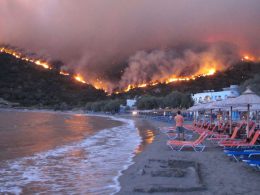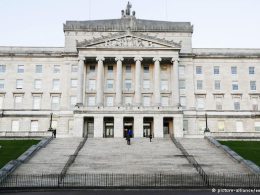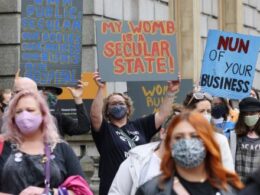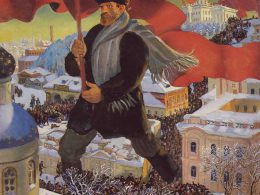By James McCabe
With all eyes now on the escalating tension between Israel and Iran, the world’s attention is shifting away from the genocide in Gaza. But the global protest movement must continue to expose this painfully dark chapter of human history; it must relentlessly resist the Israeli State’s attempts to normalise this obscene, supremacist violence.
After six months of genocidal war, famine approaches northern Gaza. People there are now “surviving” on a daily average of 245 calories. Dr Umaiyeh Kammash, director of the Juzoor charity service, has described what he’s seen there as “hell on earth”. Many children show signs of acute hunger: “Their bones are becoming visible and they’re very thin. Many are also suffering dehydration, diarrhoea and infection.” Without question, this horror is the result of detailed military calculations.
Imperialist complicity
Despite some verbal backtracking, The White House has fully supported these crimes, including the expulsion of UN aid agencies from the Strip. The US has made 100+ weapons sales to Israel since October, including tanks and thousands of bombs. Washington has also pledged to continue to fund the Israeli military with billions of dollars.
The US and European ruling classes have long nurtured the Israeli State as their “strategic asset” in the Middle East. A state that guarantees Western imperialist domination of the region’s natural resources and cheap labour. In the 1980s, US Secretary of State Alexander Haig even stated his view that “Israel is the largest American aircraft carrier in the world that cannot be sunk.”
As such, Britain, France and the US leapt to Israel’s defence to intercept missiles and drones from Iran, and a spokesperson from the US State Department declared that the US’s “commitment to Israel’s security is sacrosanct.” Iran launched its attack on Israel in response to a provocative Israeli bombing of the Iranian consulate in Syria. Israel then launched a missile on the Isfahan region of Iran. Ordinary people in Iran and Israel have nothing to gain from the reckless actions of their ruling classes, who are using the tensions to consolidate their rule domestically while attempting to intimidate neighbouring states.
The obscured truth of the atrocities in Gaza
Since the Iranian attack on Israel, Biden has reiterated his “ironclad” support for the Israeli regime and his administration is discussing plans with the IDF for a bloody ground invasion of Rafah in southern Gaza. To top it off, two extra Israeli battalions have been mobilised into Gaza over the past couple of days.
This military escalation in Gaza is in a context where Israeli airstrikes have already destroyed most of the Strip’s homes and infrastructure, displacing almost two million people. Right now only nine of Gaza’s 36 hospitals are even partially functional. At least 34,000 Gazans have been killed since early October. With the complicity of the Western media, the true extent of the horror has been hidden from the broader public outside Palestine.
The Israeli occupying forces do not allow foreign journalists to enter the enclave, and they have killed 103 Palestinian journalists over 150 days. Gazan journalist, Ibtisam Mahdi, has travelled from place to place with her young family seeking refuge while mourning the death of her brother, whom Israeli soldiers killed. Much of her harrowing experience is all too typical for Gazans at the moment:
“Recently, my daughter fell ill and lost half her body weight… Aside from food, we lack gas and electricity, relying instead on firewood to prepare our meals and to heat up canned food… The number of journalists that have been martyred in the past six months is so high that friends have shut their doors on my family because they didn’t want a journalist staying with them, believing us to be a target.”
Israeli media: cheerleaders for violence
The +972 Magazine – a publication based in Israel – described how news coverage by the mainstream media there has become extraordinarily biassed:
“Israeli journalists cover current events in Gaza almost entirely through the single lens of October 7 and its ripple effects. This is a conscious decision by the Israeli media. In an interview for The New Yorker, Ilana Dayan, one of Israel’s most highly-regarded journalists, explained, ‘We interview people about October 7 – we are stuck on October 7.’… Most Israeli news outlets rarely even update the number of Palestinian casualties nor do they inform their viewers that approximately 70% of the victims of the Israeli offensive are women and children. Most disturbingly, Israeli TV news takes an active role in dehumanising Palestinians. Channel 14 has consistently promoted abominable views – such as calling for the annihilation of Gaza, and describing all Gazans as terrorists and legitimate targets – which are parroted by leading anchors and correspondents.”
Hamas’s brutal attacks on innocent Israeli civilians on 7 October have caused deep wounds within Israeli society. It was an indefensible attack that we have completely and consistently opposed. However, the movement for Gaza should not allow the Israeli ruling class and Western imperialism to spin the narrative that ‘history began on 7 October’ or to weaponise the violence of that day to further dehumanise Palestinians.
Gaza’s recent history
For the past 17 years, the Israeli state has orchestrated a total blockade of air, land and sea around Gaza (with the complicity of the Egyptian state). This blockade led to the extreme de-development of Gaza’s economy. On top of the consistent brutality toward its people, two deadly invasions in 2008 and 2014 massacred thousands.
In 2018, a peaceful protest movement emerged called the ‘Great March of Return’. Every Friday Palestinians would gather and march to the border fence chanting for an end to the blockade. This 18-month-long protest movement saw no less than 4,903 people – including many children – shot in the lower limbs by Israeli snipers. An investigation by the Human Rights Council found “reasonable grounds to believe” that Israeli snipers shot disabled demonstrators “intentionally, despite seeing that they had visible disabilities”.
Overall, more than 7,000 Palestinians in Gaza were killed by Israeli forces between 2000 and October 2023. Hence, any narrative of the conflict that begins with the attack on 7 October is a grotesque distortion.
Dehumanising spin
It has been shocking for outsiders to hear the extremely bigoted language about Palestinians by Israeli officials since October 2023. For example, Israeli Defence Minister Yoav Gallant said “Gaza won’t return to what it was before” and “We will eliminate everything”. The Israeli Minister for Heritage Amichai Eliyahu declared that in his opinion, “there is no such thing as uninvolved civilians in Gaza.”
However, overtly racist and supremacist public statements by Israeli officials are nothing new. Former prime minister Golda Meir famously proclaimed in 1969 that “there was no such thing as Palestinians.” In a speech to the Knesset in 1983, IDF chief of staff Raphael Eitan exclaimed: “When we have settled the land, all the Arabs will be able to do about it will be to scurry around like drugged cockroaches in a bottle.” This type of language is used to try to legitimise the Israeli State’s genocidal violence against Palestinians.
The dehumanisation of Palestinians was reinforced by widespread, false rumours about what happened on 7 October. Al Jazeera’s investigative unit has produced an authoritative documentary film that details the awful atrocities and war crimes carried out by Hamas, while also showing that many of the lurid accounts that came from Israeli sources were false. President Biden repeatedly parroted early reports of burned and beheaded babies, for example. The hysteria induced by these false reports created an atmosphere in which Florida Republican senator Marco Rubio comfortably stated, “I don’t think there’s any way that Israel can be expected to coexist or find some diplomatic offramp with these savages.”
When the dust settled, there was no evidence of the deliberate killing of babies or many of the other claims about 7 October. As has often been the case throughout history, the violence of the colonised is portrayed as being more extreme and “sadistic” than the violence of the coloniser.
Mass struggle against Israeli state terror
In general, the international grassroots movement for Palestine tends to underestimate the power that Palestinians can wield if they organise collectively in the West Bank and East Jerusalem. The Palestinian masses on both sides of the Green Line represent a powerful force. For example, they constitute a large proportion of the healthcare and construction workforce. The mobilisation of this force can deliver serious blows to the Israeli occupation and its imperialist backers. The “Strike for Dignity” in 2021 rattled the Israeli ruling class, as 65,000 construction workers from the West Bank and East Jerusalem withheld their labour to oppose Israel’s bombing of Gaza at that time.
The First Intifada was a mass uprising from below of Palestinians that began in 1987. This sustained campaign of workers’ strikes and street protests won major global support for the cause of Palestinian liberation. During the First Intifada, the mass of the people directed their own struggle, including forming democratically elected ‘popular committees’.
In contrast to the First Intifada, what became known as the Second Intifada began as a mass movement of strikes and street protests but then transformed into a campaign predominantly of suicide bombings by Hamas and Fatah. Palestinian historian Rashid Khalidi documents how most Palestinians opposed these methods:
“The terrible violence of the Second Intifada erased the positive image of Palestinians that had evolved… through the First Intifada… In effect, suicide bombings served to unite and strengthen the adversary, while weakening and dividing the Palestinian side. By the end of the Second Intifada, according to reliable polls, most Palestinians opposed this tactic. Thus… on a strategic level, these attacks were massively counterproductive.”
The Second Intifada coincided with Western imperialism’s Islamophobic “war on terror” in the post-9/11 period. The Western media regularly broadcast stories about suicide bombings that targeted Israeli civilians. This coverage eclipsed that of the much greater violence perpetrated against Palestinians by the Israeli state at the time. The Israeli state used the fear of suicide bombings within Israeli society to ramp up repression in the Occupied Territories and to vilify anti-Zionist political organisations within Israel. Khalidi documents how the Israeli state even assassinated members of Hamas who were opposed to suicide bombings: “That some of these assassinations were driven by political rather than military or security considerations was made clear with the killing of Isma’il Abu Shanab, for example, who was a vocal opponent within Hamas of suicide bombings.”
Western media and politicians constantly present a double standard that gives legitimacy to Israeli State violence while questioning the right of Palestinians to resist the racist and colonial oppression they face. In the face of this double standard, the unreserved right of Palestinians to revolt against the violence of the Israeli army and pogromist settlers, including with arms in hand, must be defended. A new Intifada along the lines of the mass struggle and popular committees of the First Intifada could protect the safety of Palestinians in the West Bank and East Jerusalem and pose a real challenge to Israeli capitalism.
Resistance in the West Bank and East Jerusalem
Over 630,000 Israeli settlers are living in the Occupied Territories. The colonial, apartheid nature of the settlers’ existence fosters a racist, supremacist outlook. The settlers have the right to vote, access clean water; and to travel into Israel on the motorway whenever they want. All these rights are denied to their Palestinian neighbours, who are increasingly having their homes bulldozed to make way for new Israeli settlements. Settlers also have the right to carry guns and often enact violence against Palestinians with impunity. A report by the Israeli organisation Yesh Din found that 93% of all investigations into settler attacks against Palestinians in the occupied West Bank were closed without an indictment in the period between 2005 and 2022. Since October 2023, at least 468 Palestinians have been killed by Israeli forces or settlers across the West Bank.
If popular committees along the lines of the First Intifada were organised today, they could protect Palestinians and circumvent the conservative role played by the trade union officialdom in the Occupied Territories. The Palestinian General Federation of Trade Unions is closely tied to the Palestinian Authority – Israel’s puppet regime in the West Bank. The strikes and protests by the Independent Teachers’ Movement against the Palestinian Authority before October 2023 gave an inspiring example of grassroots struggle from below. The right to form independent unions has been one of the central demands of teachers in the Occupied Territories since 2016.
Solidarity with Palestine
The global solidarity movement has been incredibly consistent for the past six months. Street protests have remained strong from the US to Indonesia. Workers have taken strike action in India, Canada, Belgium, Italy and the Spanish State against the manufacture and transportation of weapons destined for Israel. Any businesses or corporations that are profiting from the occupation of Palestine should be targeted with boycotts, occupations and workers’ strike actions. 28 Google workers in New York and California were fired for staging sit-ins under the banners of “Googlers Against Genocide” and “No Tech for Apartheid.” The trade union movement should fully back any workers who take such action even if their actions challenge legal bans against political strikes in many countries.
Dozens of pro-Palestinian protesters were arrested in Istanbul and Cairo in April 2024. And 1,500+ have been detained in Jordan since the genocide began. A renewed wave of pro-Palestine protests has frightened the Jordanian authorities and the neighbouring Kingdom of Saudi Arabia who fear that this movement could spark a revolutionary struggle that could topple their own authoritarian rule. These dictatorial regimes have been cosying up to Israel and the US for a long time. Now they, and their imperialist collaborators, are looking with trepidation as the working class and poor masses take to the streets against this genocide – soon their rule could be next.
The working classes of Egypt, Turkey and Iran could powerfully reinforce the Palestinian struggle by waging battles against their own ruling classes as well as Israel and other imperialist powers. Workers across the wider region of North Africa, the Middle East and Western Asia have a shared interest in ending the exploitation, oppression and war that capitalism fosters there. The immense wealth and resources of the region should be seized and brought into public ownership and the democratic control of the masses. The right of return for all Palestinian refugees is a central aspect of the struggle for socialist change in the region.
Anti-capitalism and opposing the occupation
Thousands of ordinary Israelis have protested to pressure the government to negotiate the release of Israeli hostages in Gaza. Many believe that the Israeli political establishment wants to prolong the war for its narrow interests. An Israeli teen, jailed for refusing the military draft, recently spoke to +972 Magazine: “I was concerned from an early age about global warming and the environment. This line of thinking led me to an anti-capitalist ideology, which brought me to anti-colonialism, and from there to the struggle against the occupation. Since the beginning of the war, I felt obligated to act… I think we must stand in solidarity with Gazans and with the Palestinians in general.”
Another young conscientious objector, Sofia Orr, explained the impact that fighting against the occupation alongside Palestinians had on her: “I understood that if I enlisted, I would be taking part in and normalising a decades-long cycle of violence. I realised that not only could I not do that, I had to do everything I could to put an end to it and resist it… My views were already relatively consolidated even before I started meeting Palestinians, but that helped to make it tangible: to meet people who we grow up being told are our enemies, and to see that they are ordinary people just like me, who want to live their lives just like me. There’s a serious problem of dehumanisation, so these encounters are really important. The moment you stop believing that Palestinians are people, it’s much easier to dismiss the idea that their lives are worth something, and to kill them without thinking twice.”
The consciousness of these young people will be reflected by more and more Israelis in the coming years as Israeli capitalism has only delivered a society based on perpetual insecurity and war. Although it seems like a distant prospect now, the conditions do exist for a united working-class movement to throw this capitalist system that breeds Islamophobia, anti-Semitism and violence into the dustbin of history where it belongs.
A democratic socialist Middle East and Western Asia would put an end to capitalist rule and would at last allow for real self-determination for all nationalities; whether Palestinians, Israelis, Kurds, Armenians, Azerbaijanis, and the rights of all religious and ethnic minorities would be guaranteed. Anyone who wants to see an end to the horror we’re witnessing must stand with Palestinians and the struggle for socialist change.












